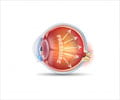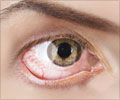More than 8.4 million people in Asia will turn blind from glaucoma by 2010 if they do not undergo timely treatment, a region-wide survey released on Monday showed. Glaucoma, irreversible
A large survey has said that more than 8.4 million people in Asia will turn blind from glaucoma by 2010 if they do not get proper treatment.
Glaucoma, irreversible damage on the optic nerve caused by high pressure within the eyeball, was the world's second leading cause of blindness after cataract, according to data released by All Eyes on Glaucoma, a global education campaign.High blood pressure, family history and a prevalence of the disease among Asians were among the risk factors contributing to the predicted high figure, the group said.
"Whereas cataract can be cured by surgery, glaucoma can lead to irreversible loss of eyesight and is the single largest cause of preventable blindness in Asia," said Ivan Goldberg, president of World Glaucoma Association, at a press conference held in Hong Kong on Monday.
The survey, which interviewed 935 people from nine Asian countries including China and India, was a response to a low level of awareness. It showed that only 54 percent had even heard of glaucoma.
Asians are more prone to glaucoma because their eyes are generally smaller than Westerners, leading to higher pressure within the eyeball, said Clement Tham, professor of ophthalmology at Chinese University of Hong Kong.
Prin Rojanapongpun, an ophthalmology professor from Thailand, said that many pharmacies in Asia sold eye drops containing steroids to treat itchiness and dryness that could lead to glaucoma with prolonged use.
Advertisement
Blindness from glaucoma could be prevented by using eye drops, laser treatment or surgery if detected at an early stage, Goldberg said.
RAS/L










